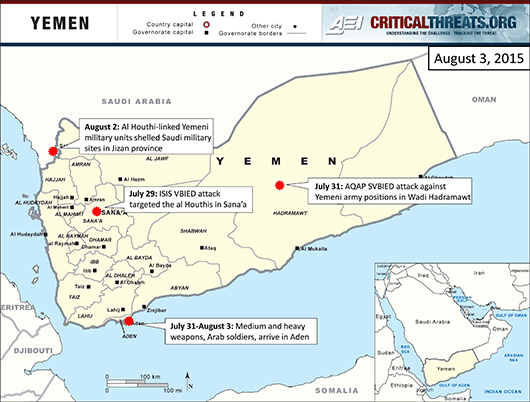Al Qaeda in the Arabian Peninsula (AQAP) continues to control one of Yemen’s port cities and may be seeking to expand direct control in Wadi Hadramawt as both Yemeni and regional security forces focus on the fight in central Yemen. The Saudi Arabia-led coalition appears to be preparing for a second offensive as part of “Operation Golden Arrow” to roll back the territory held by the al Houthis.
AQAP may be looking to secure Wadi Hadramawt. AQAP attacked a Yemeni army position outside of Qatan, Hadramawt, on August 31. An AQAP suicide bomber drove a vehicle-borne improvised explosive device (VBIED) into a checkpoint, killing nine soldiers from the 135th brigade. The 135th brigade commander was injured in the attack. The site of attack is along a road that controls easy access to the wadi. Separately, AQAP militants flogged eight people in al Mukalla, Hadramawt, where AQAP has governed through a proxy tribal council since April 2, according to reports.
Anti-al Houthi forces are preparing for a final push to recapture al Anad military base in Lahij governorate. The al Houthis and Saleh loyalists have held al Anad military base since the end of March, and the base itself controls the primary road north from Aden city. Reports indicate that heavy armor units are arriving in Aden, primarily from the UAE, and that “hundreds” of soldiers arrived on August 2. Yemeni military and port officials in Aden reported on the arrival of additional medium and heavy weapons to arm the anti-al Houthi militias fighting there in late July. The presence of additional foreign troops to bolster the local anti-al Houthi militias may be an attempt to show the strength of Hadi’s government and discourage southerners from seeking to fully secede.
Abdu Rabbu Mansour Hadi’s government and the Saudi Arabia-led coalition will use the foothold in Aden to push north against the al Houthis and to re-establish Hadi’s government inside Yemen. Yemeni Vice President Khaled al Bahah arrived in Aden on August 1 along with six other Yemeni ministers. Bahah traveled throughout the newly liberated city, promising the return of “normal life” to citizens. Bahah’s spokesman described Aden as the “key to victory” in Yemen, further underscoring the belief that Aden will serve as a beachhead for a coalition-backed offensive against the al Houthis. Separately, Hadi appointed three new advisers to the presidency, including former southern leader Haidar Abu Bakr al Attas, member of the General People’s Congress (GPC) ruling party Ahmed Obaid bin Daghir, and Abdul Aziz Jabari, who split from the GPC in 2011.
Al Houthi leader Abdul Malik al Houthi issued a defiant speech in the face of military losses. He called for his supporters to continue to fight, describing the success of the Saudi Arabia-led “Operation Golden Arrow” as a limited achievement and that the advances would “collapse.” Individuals close to the al Houthis have described a continuous deployment of al Houthi fighters into Taiz and Aden, where the Operation Golden Arrow offensive has focused, suggesting the al Houthis suffered significant casualties. Abdul Malik al Houthi added that a political solution to the conflict was still possible. The al Houthis have been open to political negotiations, but refused to participate under the precondition of disarmament put in place by UNSCR 2216. The al Houthis continue to push forward with governance plans for Yemen and recently announced plans to construct an oil port with an initial capacity of 500,000 tons in al Salif district in al Hudaydah, near the Ras Isa floating export terminal.
Al Houthi-linked attacks along the border with Saudi Arabia increased. Yemeni army units operating alongside the al Houthis reportedly fired artillery shells at al Radif military site and over 20 rockets at al Mizab military camp and ten rockets at al Ain Hara military camp in addition to other locations in Jizan province. Saudi Arabia reported that at least one of its citizens was killed in an attack on August 2.
Former Yemeni President Ali Abdullah Saleh laid out a way forward in Yemen in an interview. He told the Huffington Post Arabic that Abdu Rabbu Mansour Hadi should be tried for treason. Saleh also condemned Saudi Arabia for its current role in Yemen – now an “aggressor against our people” – and for harboring “criminal elements” behind the June 3, 2011 mosque attack that targeted Saleh and killed senior government officials. He called for an end to Saudi Arabia’s military campaign in Yemen, for the return of Yemeni stakeholders to the negotiating table under the auspices of the UN, for reparations for the Yemeni people, including reconstruction of destroying infrastructure, and for a Yemen-Saudi Arabia dialogue to resolve outstanding issues.
The Islamic State in Iraq and al Sham (ISIS) released its first report on service-provision in Yemen. ISIS’s Wilayat Aden, a cell that became active in late spring and resumed activity again following Operation Golden Arrow, released a photo set entitled, “Health Services: Visit to the Medical Center of Office of Health,” on July 28. (Source available by request.) The photos showed care given to patients in a room with the black flag with the shahada hung in it. They are the first indication that ISIS is attempting to provide services to Yemenis. Yemen’s most active ISIS cell, Wilayat Sana’a, conducted another VBIED attack targeting the al Houthis in Sana’a on July 29.
The deployment of additional military assets to support anti-al Houthi forces in Aden may be sufficient to re-invigorate the stalled offensive against the al Houthis. The al Houthis, meanwhile, still seem unprepared to concede to Hadi’s preconditions at the political negotiating table, which include complete disarmament. The focus on the dynamics between pro- and anti-al Houthi forces distracts from activities of AQAP, which continues to exploit the crisis to expand its presence in Yemen.
Joseph Hughes and Joshua Koontz contributed research to this report.
← PREVIOUS |
NEXT → |

